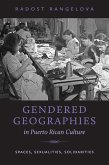"This book explores the contraction of what it means to be free in post-liberalization India. While globalization is often described as a vehicle through which to eliminate the constraints of 'traditional' roles tied to gender and caste, in reality the opening up of the Indian economy in the 1990s has led to a steady decline in freedom for many within these groups. This book explores how the global spread of capitalism exacerbates existing inequalities based on traditional femininities and masculinities while creating new hierarchies. Reading texts as diverse as Thrity Umrigar's The Space Between Us, Chetan Bhagat's One Night in a Call Center, Mohsin Hamid's How to Get Filthy Rich in Rising Asia, and Arvind Adiga's The White Tiger, Mangharam fleshes out how notions like 'free trade' and 'market value' are experienced, embodied, and challenged by those who occupy the bottom of the socio-economic ladder, how they are experienced by women differently than by men, as well as the great promise that storytellers hold out in opening up new spaces of freedom and horizons for the self"--
Hinweis: Dieser Artikel kann nur an eine deutsche Lieferadresse ausgeliefert werden.
Hinweis: Dieser Artikel kann nur an eine deutsche Lieferadresse ausgeliefert werden.








